人教新目标2018八年级英语下册 Unit 2 I’ll help to clean up the city parks Self Check练习课件
人教版新目标八年级下册英语Unit2_I_will_help_clean_up_the_city_parks全单元
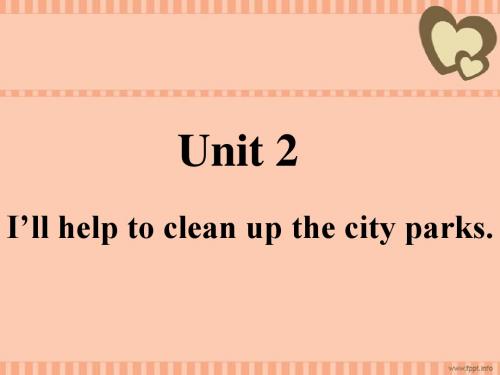
cheer up the old people
give out(分发,派发) food
If I had lots of money, I would…
set up a Hope School
建立、建造
=establish
help poor kids
2 They told me stories about the past and how things used to be. 他们给我讲过去的生活经历,讲过去是什么 样子的。 used to be/do 曾经。。。 She used to live in that city before. She didn't use to live in that city before. used to be /do过去常做某事,现在不那样了 Did you use to sing when you do housework?
Unit 2
I’ll help to clean up the city parks.
Section A
Warming up
Do you often help others?
What other ways we could help people?
I helped to clean the classroom. I helped my parents with the chores.
You could help the old people cross the street. _______________________________________________
_______________________________________________ You could help the police catch the thieves. _______________________________________________ You could help the old people clean up their houses. You could give the money to the charity and help the _______________________________________________
人教版英语初二下册 Unit 2 I`ll help to clean up the city park 知识讲解

Unit 2 I’ll help to clean up the city parks.词句精讲精练词汇精讲1. clean upclean up意为“打扫”,up为副词,此短语是动副型短语,如果宾语为代词,应放在短语中间;如果宾语是名词,可放于短语之间或两词之后。
例如:Please clean up this street at once. 请马上把这条街打扫干净。
This street is dirty. Please clean it up. 这条街道太脏了,请把它打扫干净。
2. cheer upcheer up意为“变得高兴,振奋起来”,是“动词+副词”结构的短语。
cheer up既可作及物动词短语,也可作不及物动词短语。
例如:He cheered up at once when I agreed to help him. 我同意帮助他时,他马上高兴起来。
Cheer up! The news isn’t too bad. 振作起来!这消息不是太坏。
He took her to the cinema to cheer her up. 为了让她高兴,他带她去了电影院。
【拓展】(1) cheer作不及物动词,意为“欢呼;喝彩”。
例如:The girls cheered as the famous singer arrived. 当这位著名的歌手到达时,女孩子们大声欢呼。
(2) cheer作及物动词,意为“为……欢呼,高呼”。
例如:The whole village turned out to cheer the hero. 全村人都出来向那位英雄欢呼。
(3) cheer作可数名词,意为“欢呼声;喝彩声”。
例如:We can hear the cheers of students outside the gym. 我们在体育场外就能听到学生的欢呼声。
(4) cheer on意为“为……加油”。
例如:We will have a basketball game this afternoon. Would you like to come and cheer us on?我们今天下午有一场篮球比赛,你愿意来为我们加油吗?3. give outgive out意为“散发;分发”,相当于hand out,是“动词+ 副词”结构的短语动词。
人教新目标八年级英语下册Unit2 I'll help to clean up the city parks.单元练习【含答案】

人教新目标版八年级下册Unit2 I'll help to clean up the city parks.单元练习一、听力(听力)(共20小题;共20分)听力理解(三部分,计20分)A. 选出你所听到的字母或单词。
(共5小题,每小题1分)1. A. stomachache B. sore throat C. bad cold2. A. take after B. give out C. clean up3. A. happily B. heavily C. suddenly4. A. three years B. three months C. thirteen years5. A. a art museum B. the Great Wall C. the Palace MuseumB. 情景反应。
下面每小题你将听到一个句子,请从所给的答案中选择适当的答语。
(共5小题,每小题1分)6. A. Yes, please. B. You are welcome. C. Yes, sure.7. A. That's great. B. No, thanks. C. I have a headache.8. A. Yes, I did. B. No, I haven't. C. No, I am not.9. A. Because I've bought a new one.B. You can have for 500 yuan.C. I bought it last year.10. A. I am watching TV.B. I was dong my homework.C. She was sleeping.C. 对话理解。
根据你所听到的对话,选择正确答案回答问题。
(共5小题,每小题1分)11. What's the matter with her?A. She has a cough.B. She has a fever.C. She has a toothache.12. What is she going to do tonight?A. See a the movie.B. Go to a party.C. Go out for a dinner.13. What class did Judy like today?A. English.B. Math.C. Chinese.14. What is the relation(关系) between the two speakers?A. Teacher and student.B. Doctor and patient(病人).C. Mother and son.15. What did John do?A. He went to see a doctor.B. He helped a hurt dog.C. He took a dog to school.D. 根据你所听到的内容和实际情况,写出简要答语,完成录音问卷调查表。
八年级英语下册 2 I'll help to clean up the city par
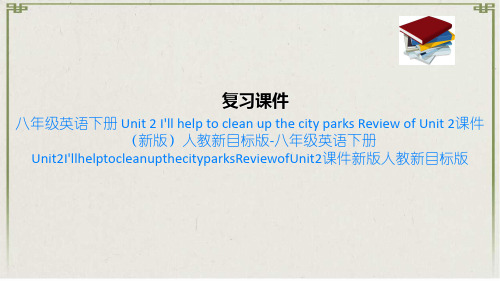
3. As a volunteer, the girl wants to visit sick kids in
the hospital _______ them up.
A. to cheer
B. cheer
C. cheering
D. cheered
短语动词
短语动词是由动词加介词、副词或 其他词构成的固定词组或习语,其作用 和动词相近。
9. I’m __e_x_c_it_e_d_ (excite) about your change. I’m happy you are a good student now.
三、单项选择。
1. The teenagers often help ______ water and
food to those people in need.
5. I’m able to have a “dog helper” because of your _k_i_n_d_n_e_s_s (kind).
6. Do you have any __d_i_ff_i_c_u_lt_ie_s__ (difficult) in learning English?
viewofUnit2课件新版人教新目标版
看看远处,要保护好眼睛哦~站起来
动一动,久坐对身体不好哦~
3. It took me _se_v_e_r_a_l (一些) days to finish the work. 4. To our __j_o_y__ (高兴), we arrived home before it
7. After six months of __tr_a_i_n_in_g__ (train), he is now good at playing basketball.
人教版八年级英语下册Unit 2 I'll help to clean up the cit

Unit2:I’ll help to clean up the city park.Section A:知识点一:clean up的用法:打扫干净如果宾语是名词:可放在之间或者末尾是代词:只能在之间。
例题:On Earth Day, many people in our city go to People’s Park to .A.Clean up itB.clean them upC.clean it upD.clean it up知识点二:cheer up使变得高兴;振奋起来如果宾语是名词:可放在之间或者末尾是代词:只能在之间。
例题:John isn’t happy today.Let’s go and .Good idea.A.cheer him upB.cheer up himC.to cheer up知识点三:give out散发,分发如果宾语是名词:可放在之间或者末尾是代词:只能在之间。
give的其他短语Give away 赠送give up 放弃give back 归还give off 发出放出Give sb sth给某人某物give in屈服例题:Could you please teach me how to red envelopes on WeChat? Sure. Let me show you.A.give outB.give backC.give way知识点四:put offput off意为“推迟”。
The concert was put off because of the heavy rain.演唱会因为大雨而被推迟了。
拓展:常见的put短语有:put off推迟;延迟穿上;put on展出;上演戴上put away收起来put out熄灭;扑灭put up with容忍put up搭建;建造张贴提升例4They the date of the meeting because of the bad weather.A.put offB.gave awayC.put onD.turn down知识点五used to的用法used to表示“过去常常;以前经常”,后跟动词原形,用来描述过去经常发生的动作或存在的状态。
新目标英语8年级下二单元 I'll help to clean up the park语法详解
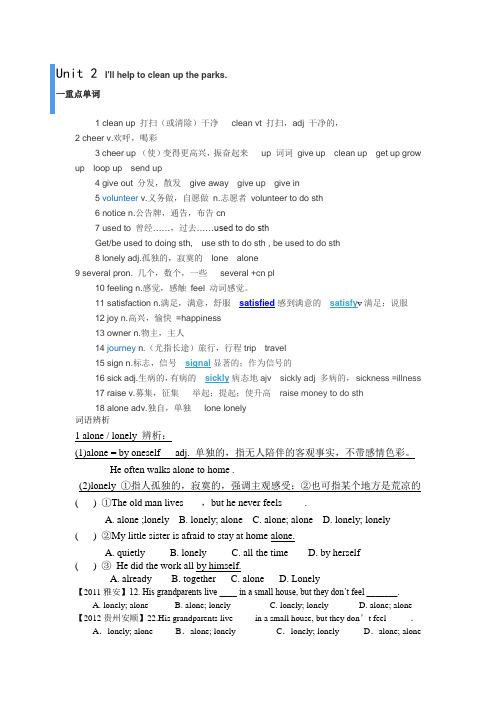
Unit 2I'll help to clean up the parks.一重点单词1 clean up 打扫(或清除)干净clean vt 打扫,adj 干净的,2 cheer v.欢呼,喝彩3 cheer up (使)变得更高兴,振奋起来up 词词give up clean up get up growup loop up send up4 give out 分发,散发give away give up give in5 volunteer v.义务做,自愿做n.志愿者volunteer to do sth6 notice n.公告牌,通告,布告cn7 used to 曾经……,过去……used to do sthGet/be used to doing sth, use sth to do sth , be used to do sth8 lonely adj.孤独的,寂寞的lone alone9 several pron. 几个,数个,一些several +cn pl10 feeling n.感觉,感触feel 动词感觉。
11 satisfaction n.满足,满意,舒服satisfied感到满意的satisfy v满足;说服12 joy n.高兴,愉快=happiness13 owner n.物主,主人14 journey n.(尤指长途)旅行,行程trip travel15 sign n.标志,信号signal 显著的;作为信号的16 sick adj.生病的,有病的sickly 病态地ajv sickly adj 多病的,sickness =illness17 raise v.募集,征集举起;提起;使升高raise money to do sth18 alone adv.独自,单独lone lonely词语辨析1 alone / lonely 辨析:(1)alone = by oneself adj. 单独的,指无人陪伴的客观事实,不带感情色彩。
人教新目标八年级英语下册unit 2知识点
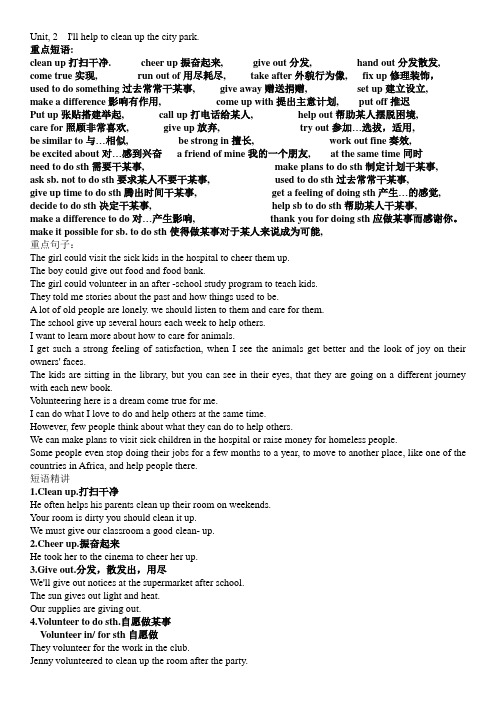
Unit, 2 I'll help to clean up the city park.重点短语:clean up打扫干净. cheer up振奋起来, give out分发, hand out分发散发, come true实现, run out of用尽耗尽, take after外貌行为像, fix up修理装饰,used to do something过去常常干某事, give away赠送捐赠, set up建立设立,make a difference影响有作用, come up with提出主意计划, put off推迟Put up张贴搭建举起, call up打电话给某人, help out帮助某人摆脱困境,care for照顾非常喜欢, give up放弃, try out参加…选拔,适用,be similar to与…相似, be strong in擅长, work out fine奏效,be excited about对…感到兴奋 a friend of mine我的一个朋友, at the same time同时need to do sth需要干某事, make plans to do sth制定计划干某事,ask sb. not to do sth要求某人不要干某事, used to do sth过去常常干某事,give up time to do sth腾出时间干某事, get a feeling of doing sth产生…的感觉, decide to do sth决定干某事, help sb to do sth帮助某人干某事,make a difference to do对…产生影响, thank you for doing sth应做某事而感谢你。
make it possible for sb. to do sth使得做某事对于某人来说成为可能,重点句子:The girl could visit the sick kids in the hospital to cheer them up.The boy could give out food and food bank.The girl could volunteer in an after -school study program to teach kids.They told me stories about the past and how things used to be.A lot of old people are lonely. we should listen to them and care for them.The school give up several hours each week to help others.I want to learn more about how to care for animals.I get such a strong feeling of satisfaction, when I see the animals get better and the look of joy on their owners' faces.The kids are sitting in the library, but you can see in their eyes, that they are going on a different journey with each new book.V olunteering here is a dream come true for me.I can do what I love to do and help others at the same time.However, few people think about what they can do to help others.We can make plans to visit sick children in the hospital or raise money for homeless people.Some people even stop doing their jobs for a few months to a year, to move to another place, like one of the countries in Africa, and help people there.短语精讲1.Clean up.打扫干净He often helps his parents clean up their room on weekends.Your room is dirty you should clean it up.We must give our classroom a good clean- up.2.Cheer up.振奋起来He took her to the cinema to cheer her up.3.Give out.分发,散发出,用尽We'll give out notices at the supermarket after school.The sun gives out light and heat.Our supplies are giving out.4.Volunteer to do sth.自愿做某事Volunteer in/ for sth自愿做They volunteer for the work in the club.Jenny volunteered to clean up the room after the party.I want to be a volunteer in the city.5.Put off doing sth推迟干某事They put off the match because of the heavy rain.Put up张贴, put back放回原处, put out熄灭, put down放下, put away.收起来放好put one's hear into全神贯注于某事, put on穿上,上演,发胖,6.Notice sb do /doing sth注意到某人做了/正在做某事Notice that.注意到I noticed Jim get into the teacher's office.I noticed some students getting off the bus when I walked past the school.She noticed that the old man had trouble breathing.e up with,提出,想出Can't you come up with a better idea?Come over过来顺便拜访, come on快点儿,加油, come out出来开花,出版,come up走进,走上前来, come down下来, come from来自, come true实现。
八年级英语下册Unit2I’llhelptocleanupthecityparks第4课时SectionB2a_2e教案新版人教新目标版
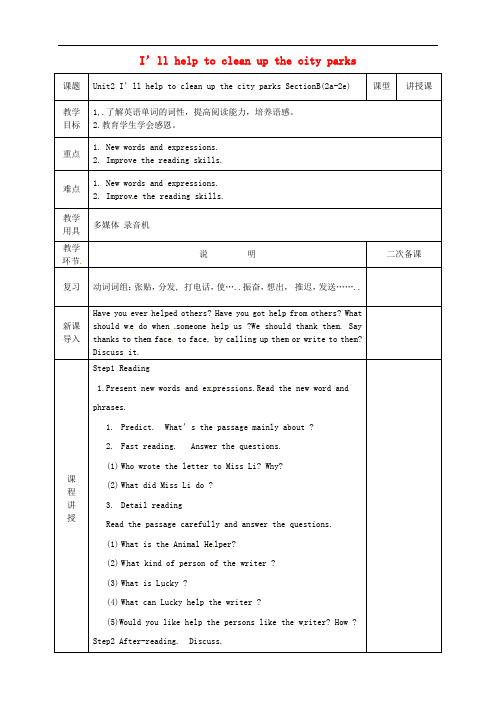
Talk about your hometown.
Where is your hometown?
Do you like your hometown?
What are some of the special places in your hometown?
Step 3Group work
1a,Check (√) the places or things you can find in your town or city.
First let the students go through the words .
Check the answers and read the words aloud.
especially副词,意为“尤其;特别;格外”,在句中作状语,用于列举某个特例或某事物的特殊性。形容词为special“特别的,特殊的”。
8. consider动词,意为“考虑”,=think about,后跟名词,代词,动名词,宾语从句或“疑问词+不定式”。
9. in my opinion
2b,Find expressions in the passage that have the same meanings as these words and phrases.
1. look forsearch for5. go backreturn
2. considerregard6. changesdevelopments
3. across fromopposite7. areaplace
4. in one’s opinionaccording to
Then read the words and phrases aloud
新人教版八年级英语下册Unit2-I'll-help-to-clean-up-the-city-parks教案
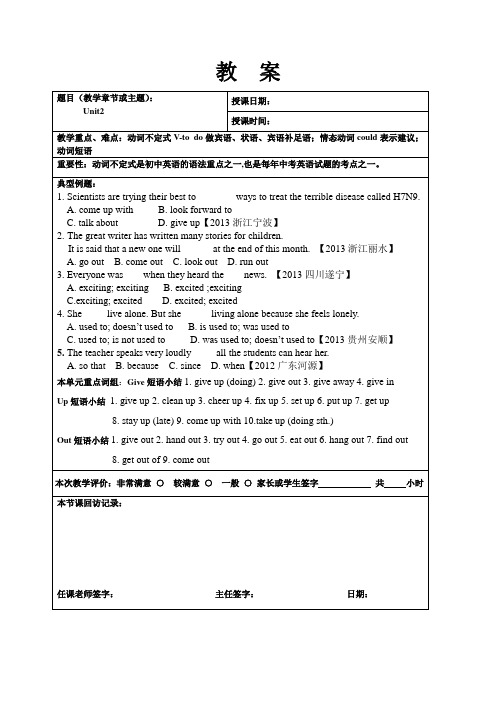
教案讲义学生:任课教师:例:Several boys were injured. 有几个小伙子伤了。
My friend speaks several languages. 我的朋友能讲几种语言11. Last year, she decided to try out for a volunteer after-school reading program.去年,她决定尝试在一个课后阅读项目中做一名志愿者。
【解析】try out 尝试;实验【拓展】try on 试穿①We should __________________(尽最大努力)to be happy in the future.②We should try ___ much fruit.A. eatB. to eatC. eatingD. eats12. care for sb./sth.照顾;照料care【名词】小心,关心;take care of = look after →【动词】care about sb./sth.关心,在意某人/事例:Many students in our school _______ the old and they usually offer their seats to them on buses. A.worry about B. care for C. agree with D. take care【拓展】care的短语总结take care =be careful v.当心,小心;take care of =look after v.照顾,照料,照看take care of 处理,做完练习:Thanks for your invitation, but I’m so sorry I can’t go. I need to ______ my baby at home. A. take away B. take off C. take care of D. take out of13. But I want to learn more about how to care for animals...但是我想学习更多的关于如何照顾动物的知识【解析】―疑问词+不定式‖作及物动词的宾语,【记】:I don’t know what to do.I don’t know how to do it. I don’t know what to do with it.【拓展】v+up with构成的短语:catch up with赶上;追上;put u with容忍;忍得住;keep up with 跟上;跟、保持联系end up with 结束;以.......而结束17.They told me stories about the past and how things used to be.他们给我讲过去的故事,并告诉我过去事情是什么样子的。
八年级英语下册Unit2I'llhelptocleanupthecityparks单元写作专
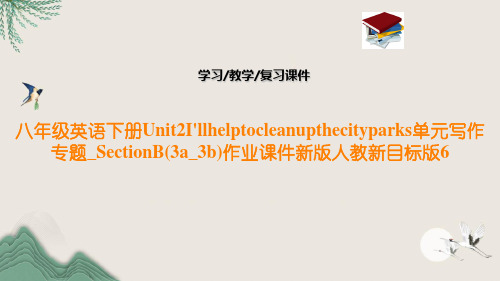
⑥Volunteering here is a dream come true for me. ⑦Lucky makes a big difference to my life. ⑧You helped to make it possible for me to have Lucky. ⑨So I fix up the bikes and then give them away to these kids. ⑩I love animals and I was excited about the idea of having a dog.
学习/教学/复习课件
八年级英语下册Unit2I'llhelptocleanupthecityparks单元写作 专题_SectionB(3a_3b)作业课件新版人教新目标版6
Unit 2 I'll help to clean up the city parks.
单元写作专题—Section B (3a3b)
经典范文展示
为迎接国际慈善日(the International Day of Charity)的到来 , 某英文报 刊将要举办有奖征文活动 , 请你以〞I would like to ________for charity” 为题写一篇短文 , 为本次活动投稿。步骤与要点如下 :
1.确定主题 , 并在文中说明原因 ; 2.围绕主题 , 进行表达 ; 3.写出具 体计划 , 也可以讲述一段与主题有关的故事或经历。
热点作文练习
帮助别人是高尚的 , 被别人帮助是幸福的。假设你是王磊 , 是学校志 愿者俱乐部的一名成员。在志愿者日(Volunteer Day)即将来临之际 , 你 计划进行一个〞Cheer up the sick kids in the hospital”的志愿活动。请根 据下面表格中的信息 , 写一封80 词左右的演讲稿向你的同学们介绍这次 活动 , 并邀请他们加入。
2018最新人教版新目标八年级英语下册Unit2 I’ll help to clean up the city parks全单元课件
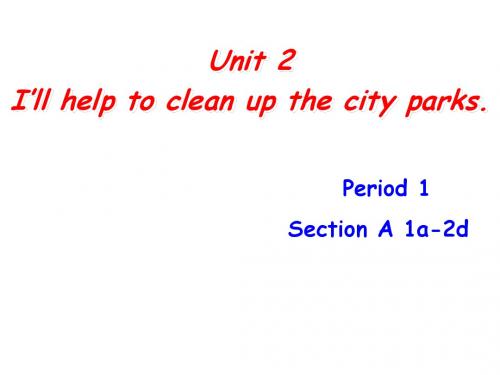
volunteer v. 义务劳动,自愿做 volunteer to do sth. 义务自愿做某事
Many people volunteer to work on the farm. 很多人志愿到农场去工作。
clean up 打扫;清除
The students take turns to clean up their classroom. 学生们轮流打扫教室。
I will … I’ d like to … I could …
help old people
cheer up sick kids
raise money
clean up the city parks
plant trees
clean up the advertisements
give out the cards
I’d like to cheer up sick kids.
volunteer
志愿者
There are many ways to help others. We could…
help old people
help to send food to the poor people
There are many ways to help others. We could…
city n. 城市 The library is in the north of the city. 图书馆在城市的北部。
notice n. 公告牌; 通告;布告
Please read the list on the notice board. 请读公告板上的名单。
sign n.
标志;信号
【英语】人教新版八年级下册Unit2Illhelptocleanupthecityparks知识点精讲-SectionB
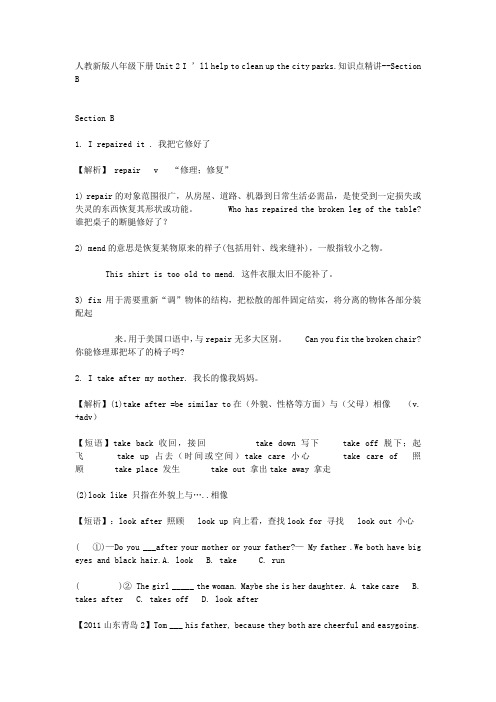
人教新版八年级下册Unit 2 I ’ll help to clean up the city parks.知识点精讲--Section BSection B1. I repaired it . 我把它修好了【解析】 repair v “修理;修复”1) repair的对象范围很广,从房屋、道路、机器到日常生活必需品,是使受到一定损失或失灵的东西恢复其形状或功能。
Who has repaired the broken leg of the table? 谁把桌子的断腿修好了?2) mend的意思是恢复某物原来的样子(包括用针、线来缝补),一般指较小之物。
This shirt is too old to mend. 这件衣服太旧不能补了。
3) fix用于需要重新“调”物体的结构,把松散的部件固定结实,将分离的物体各部分装配起来。
用于美国口语中,与repair无多大区别。
Can you fix the broken chair? 你能修理那把坏了的椅子吗?2. I take after my mother. 我长的像我妈妈。
【解析】(1)take after =be similar to在(外貌、性格等方面)与(父母)相像(v. +adv)【短语】take back 收回,接回 take down 写下 take off 脱下;起飞take up 占去(时间或空间)take care 小心take care of 照顾take place 发生 take out 拿出take away 拿走(2)look like 只指在外貌上与…..相像【短语】:look after 照顾 look up 向上看,查找look for 寻找 look out 小心( ①)—Do you ___after your mother or your father?— My father .We both have big eyes and black hair.A. look B. take C. run( )② The girl _____ the woman. Maybe she is her daughter. A. take care B. takes after C. takes off D. look after【2011山东青岛2】Tom ___ his father, because they both are cheerful and easygoing.A. looks likeB. takes afterC. doesnt’ take afterD. isn’t like3. I fixed it up. 我把它修理好了。
新目标英语八年级下Unit 2 I‘ll help to clean up the city parks全单元学案
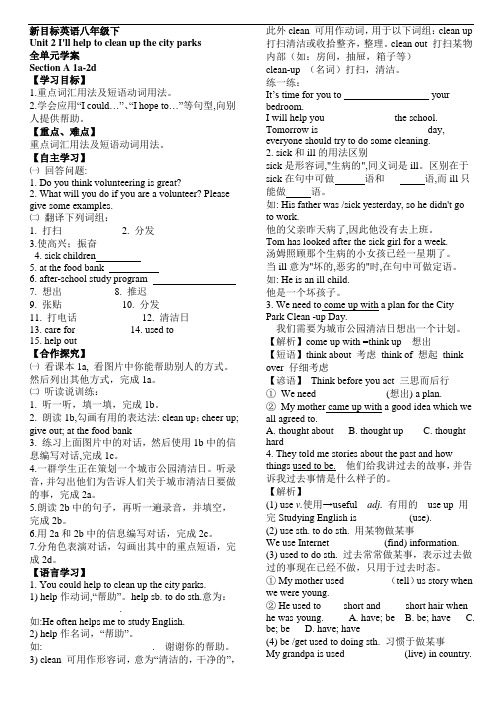
新目标英语八年级下Unit 2 I'll help to clean up the city parks全单元学案Section A 1a-2d【学习目标】1.重点词汇用法及短语动词用法。
2.学会应用“I could…”、“I hope to…”等句型,向别人提供帮助。
【重点、难点】重点词汇用法及短语动词用法。
【自主学习】㈠回答问题:1. Do you think volunteering is great?2. What will you do if you are a volunteer? Please give some examples.㈡翻译下列词组:1. 打扫________2. 分发________________3.使高兴;振奋____________4. sick children5. at the food bank6. after-school study program7. 想出__________ 8. 推迟_________________ 9. 张贴____________10. 分发______________ 11. 打电话_____________12. 清洁日_______ 13. care for __________ 14. used to__________ 15. help out_____________【合作探究】㈠看课本1a, 看图片中你能帮助别人的方式。
然后列出其他方式,完成1a。
㈡听读说训练:1. 听一听,填一填,完成1b。
2. 朗读1b,勾画有用的表达法: clean up;cheer up; give out; at the food bank3. 练习上面图片中的对话,然后使用1b中的信息编写对话,完成1c。
4.一群学生正在策划一个城市公园清洁日。
听录音,并勾出他们为告诉人们关于城市清洁日要做的事,完成2a。
5.朗读2b中的句子,再听一遍录音,并填空,完成2b。
2018人教版英语八年级下册Unit 2《I’ll help to clean up the cit

2018人教版英语八年级下册Unit 2《I’ll help to clean up the city park》教案一. 教材分析人教版英语八年级下册Unit 2《I’ll help to clean up the city park》以志愿者活动为背景,让学生学会谈论将来的计划,并能够用一般将来时表达自己的意愿和承诺。
本节课的主要语言点是一般将来时态的构成和用法,以及如何用英语描述将来的计划和目标。
此外,本节课还涉及到一些与志愿者活动相关的词汇和表达方式。
二. 学情分析学生在学习本节课之前,已经掌握了现在时态和过去时态,对英语语法有一定的了解。
然而,一般将来时态的用法是他们尚未接触过的,需要通过本节课的学习来掌握。
此外,学生还需要提高听力、口语、阅读和写作等方面的能力,以便更好地理解和运用本节课所学的内容。
三. 教学目标1.知识目标:让学生掌握一般将来时态的构成和用法,能够用英语描述将来的计划和目标。
2.能力目标:提高学生的听力、口语、阅读和写作能力,使他们能够更好地理解和运用本节课所学的内容。
3.情感目标:培养学生的团队精神和责任感,使他们意识到参与志愿者活动的重要性。
四. 教学重难点1.重点:一般将来时态的构成和用法。
2.难点:如何用英语描述将来的计划和目标,以及如何正确运用一般将来时态。
五. 教学方法1.任务型教学法:通过设定各种任务,让学生在实际操作中学习和发展语言能力。
2.情境教学法:创设真实的语境,让学生在实践中掌握和运用语言知识。
3.合作学习法:鼓励学生分组合作,培养他们的团队精神和沟通能力。
六. 教学准备1.教材:人教版英语八年级下册Unit 2《I’ll help to clean up the citypark》相关材料。
2.多媒体设备:电脑、投影仪、音响等。
3.教学道具:志愿者服装、公园图片等。
七. 教学过程1.导入(5分钟)教师穿着志愿者服装,携带相关道具,如公园图片和垃圾袋,进入教室。
人教新目标八年级英语下册Unit 2 I'll help to clean up the city
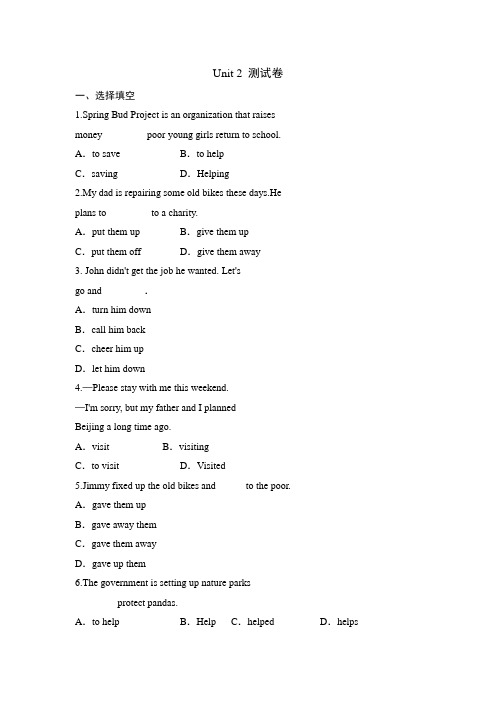
Unit 2 测试卷一、选择填空1.Spring Bud Project is an organization that raisesmoney ________ poor young girls return to school.A.to save B.to helpC.saving D.Helping2.My dad is repairing some old bikes these days.Heplans to ________ to a charity.A.put them up B.give them upC.put them off D.give them away3. John didn't get the job he wanted. Let'sgo and ________.A.turn him downB.call him backC.cheer him upD.let him down4.—Please stay with me this weekend.—I'm sorry, but my father and I planned _____Beijing a long time ago.A.visit B.visitingC.to visit D.Visited5.Jimmy fixed up the old bikes and _____ to the poor.A.gave them upB.gave away themC.gave them awayD.gave up them6.The government is setting up nature parks________ protect pandas.A.to help B.Help C.helped D.helps7.Mrs. Green refuses ________ sweet food.She doesn't want to get fat.A.eat B.eating C.to eat 8.—Would you like _____ a film with us tonight?—Sorry, I have to help my mother do housework. A.see B.to seeC.seeing D.to seeing 9.—Daniel, do you know that bees neverget lost?—Yes. Bees always remember ________ the same way as they went.A.come back B.came back C.coming back D.to come back10. Michael visits many websites ________ about Chinese culture.A.learn B.learnedC.to learn11. —My best friend went abroad. I miss herand feel down today.—Don't be sad. Here is good news for you ______.A.cheer up B.cheering up C.cheered up D.to cheer up12. Mother asks me ________ English every morning.A.read B.to readC.reading D.not read13.AHe took off his expensive watch________ the fact that he was rich.A.to hide B.hidC.hide D.hidden14.—What are you going to do tonight?—I plan ________ Days of Our Past.A.watch B.watchingC.to watch D.watched15. Harry invited me ________ with himwhen his parents were out of town.A.stay B.stayedC.staying D.to stay二、完形填空(共15小题, 每小题1分, 满分15分)It was Saturday, and tea was just over. Aunt Miriam would often cheer up the children with a story or a joke. But this Saturday was a little ________16. She asked them, “What is the best day in the year? ”“I want you all to think well, ” Aunt Miriam continued. “I have ________17 the best answer in this sealed(密封的) letter. I will give a prize of £10 to anyone who has guessed rightly. ”For a moment the children were busy thinking both of her new ________18 and of the handsome prize.“Lily has the ________19 pick! ” said Aunt. “She is the youngest. And then the others can choose afterwards according to age. ” Lily thought for a little while. Soon the answer came from her happy tongue(舌头), “It is my birthday! ” But Aunt ________20 her head.Alice, the next ________21 , said, “I think Christmas Day is. ” “Wonderful as Christmas Day is, it is not the best, ” Aunt Miriam ________22.“There's a better answer still, ” said Aunt Miriam to Mary. “I hardly know ________23 to choose. There are really no other days I can think of. Tell us, Auntie. ”“I don't like to see that prize go past without having a good ________24 for it, ” said Tom. “Is it Good Friday or Boxing Day? ” “________25 ” was the answer.“I think we'll have to give up! What is it, Auntie? ” asked Harry, unwillingly.They all drew closer to Aunt Miriam's chair. Lily climbed on her aunt's ________26 and put her face near to Aunt Miriam ________27 she wanted to know the answer first.Aunt Miriam slowly opened the letter, and there were the ________28 , “The best day in the year is today! ”“Today? ” they asked ________29. “How is that? ”“Yesterday is past, ” came the reply, “and is no longer ________30 , to make good or to mess up. Tomorrow is yet to come, and none of us knows whether we will own it. Today alone is in our hands, to do with as we will. ”They were beginning to see their aunt's meaning.()16. A. normal B. different C. exciting D. similar ()17. A. looked through B. handed outC. written downD. picked up()18. A. joke B. story C. advice D. question ()19. A. first B. second C. third D. fourth()20. A. shook B. raised C. touched D. covered ()21. A. cleverest B. quickest C. youngest D. tallest()22. A. agreed B. shouted C. promised D. disagreed ()23. A. which B. who C. when D. why()24. A. look B. lesson C. try D. chance ()25. A. Both B. Neither C. Each D. Either()26. A. foot B. knee C. arm D. hand()27. A. because B. although C. unless D. if()28. A. pictures B. signs C. words D. gifts()29. A. in excitement B. with joyC. in surpriseD. with sadness()30. A. mine B. theirs C. hers D. ours三、阅读理解(共10小题, 每小题2分, 满分20分)AJosh: Do you know about “ pay it forward coffee” at Flora Café?Eric: You mean volunteers pay for a cup of coffee for someone poor to have it later? Josh: Yeah. A cup of coffee is not much, but on cold winter days like today, it might warm them up a little. And maybe their hearts too.Eric: But will Flora Café really give this cup of coffee to someone later?Josh: Come on. I've known the shopkeeper well. He's an honest man. He's got a blackboard in the shop that says how many cups are paid for and how many have been given out.Eric: But how will they know who to give? Anyone can ask for it, even if they're not poor.Josh: True, but then I guess they'll just have to believe in people.Eric: Perhaps. But will poor people go and ask for a free coffee? Won't they worry about losing face?Josh: Why do you always say things like that?Eric: Well, it may happen.Josh: Yeah, I know, but I still think it's a good thing to do, and it gets people to care about others.()31. Who pays forward for the coffee?A. Josh and Eric.B. The shopkeeper.C. The volunteers.D. Josh and his family.()32. What does the underlined part “things like that” refer to (指代)?A. Time and places to offer the coffee.B. Problems about the free coffee plan.C. Ways to improve the free coffee plan.D. Good things about the free coffee plan.()33. What can we learn about Josh and Eric?A. Josh worries about losing face.B. Eric knows the shopkeeper well.C. They both believe most people are honest.D. They have different opinions about the plan.BSmile Train is a charity (慈善团体) that helps the millions of children around the world, who suffer from a facial defect (缺陷). The defect happens when a baby's top lip or mouth doesn't form properly before birth. Eating and drinking is very difficult for these babies. The charity provides free operations, which give these children a new smile, and with it, new hope and a new beginning.Children with the defect need all the help. Although many sufferers are accepted by their families, sadly, others are not. In some countries, children with this defect are often abandoned at birth because their parents feel ashamed of them or cannot afford the operations. The good news is that the operation is not difficult. It takes less than an hour and costs the family nothing. The charity raises money and finds the right medical volunteers to perform the operations.A Smile Train doctor from the UK said, “Each child who has the operation is given a second chance at life. After years of staying at home, the children can finally go to school and be happy. Every year I perform hundreds of operations free of cost through Smile Train. Some of the stories I have heard are quite surprising. One newborn baby girl was found abandoned on a train. Luckily for her, she was found and adopted (收养) by a passenger. This lady then heard about Smile Train and brought the baby to our hospital. I did the operation and gave hope to the family. Experienced doctors like me share our skills with local doctors. In this way we make sure that these operations will always be available. ”()34. Smile Train is a charity which __________.A. provides food and medical care for poor childrenB. raises money for all the doctors working in the UKC. offers free medical help to children with the facial defectD. gives children without parents new hope and a new beginning()35. The underlined word “abandoned” in Paragraph 2 is closest in meaning to __________.A. given upB. dressed upC. called upD. brought up()36. What did the doctor from the UK think of his volunteer work?A. Dangerous.B. Surprising.C. Relaxing.D. Valuable.CRachel Carson(1907—1964) was a pioneer of the world's environmental movement through her writing about the protection of the natural world. Her 1962 book Silent Spring made her well known by many people. It describes the harmful changes in the environment of using toxic(有毒的) chemicals on farmland.Carson's career started as a biologist in the US Bureau of Fisheries. In 1951 she published her book, The Sea Around Us, which became a best-seller. It made her rich enough to leave her job and devote her life to writing. She was a gifted writer. Her next two books were also about the oceans and both topped the book sales lists.Carson's book Silent Spring completely changed the way America thought about nature. It painted a bleak(荒凉的) future for the whole natural world. It led to a nationwide ban(禁止) on the use of a deadly chemical called DDT, and other toxic pesticides(农药) that farmers used for their crops. Many people say the book led to the creation of America's Environmental Protection Agency.Since her death, Carson's name has continued to be connected with protecting the environment. There is now a yearly Rachel Carson Book Prize. Norway awards the Rachel Carson Prize to women who have made great contributions to the field of environmental protection. In 1980, 16 years after her death, she was awarded the Presidential Medal of Freedom, the highest civilian honour in America.()37. What happened to Rachel Carson in 1962?A. She started to write books.B. She gave up working as a biologist.C. Her book The Sea Around Us sold well.D. Her book Silent Spring made her famous.()38. What most probably made Rachel Carson leave her job?A. She got an award.B. She published Silent Spring.C. The Sea Around Us brought her enough money.D. The US government took notice of her researches.()39. Why is the book Silent Spring important to America's environmental protection?A. It describes a silent spring.B. It topped the book sales lists.C. It changed how America thought about nature.D. It includes all Carson's research achievements.()40. What does the underlined word “It” in Paragraph 3 mean?A. The book Silent Spring.B. The way America thought.C. The US Bureau of Fisheries.D. America's Environmental Protection Agency.四、词汇运用(共15小题, 每小题1分, 满分15分)A)用方框中所给单词的适当形式填空notice, several, journey, imagine,41. Could you__________ that she played the violin alone before so many people?42. Choose __________ books from our study and then send them to the children inthe countryside.43. What do you think about the __________ to New York, Mary?44. She __________ there was a small house in front of her.45. You should face the__________ and try your best to overcome them.B)根据短文内容和所给中文提示, 在空白处写出单词的正确形式, 每空一词The World Cup has been held this year. Every four years, millions of people gather in summer to watch soccer games. They ________ 46 (欢呼) for their favorite teams and players. This year, the World Cup started on June the ________ 47 (第十四) in Russia. “Live It Up”, the official World Cup song, was performed by US artistNicky Jam, US ________ 48 (男演员) and singer Will Smith, and Albanian singer Era Istrefi. The song has a ________49 (行) that goes, “One life, live it up, cause we got one life. ” The song stands for th e ________ 50 (兴奋), the celebration and the unity that people all over the world will share ________ 51 (在……期间) the 2018 World Cup. As The Wall Street Journal put it, “Listening to the ________ 52 (音乐) encourages people to take more risks. ” Indeed, you th row ________ 53 (你自己) into it, and it moves something within people. You need your ________ 54 (脚) for soccer and you need words for music, but they arouse one and the same thing—passion—and you won't feel ________ 55 (孤单的). Let's enjoy the World Cup together.五、语法填空(每小题1分, 满分10分)The mountain was high and it was cold. Everything ________56 (cover) by snow and ice and it was dangerous. I shook in my tent as the storm tried ________57 (knock) me back to the bottom. “You will never make it to the top, ” ev eryone said, “no woman has ever climbed this mountain and only a few people have done it by themselves. ” I was so confident ________58 I would be the first woman to climb up to the top of Whitmore. I had prepared for several ________59 (month).The wind had gotten much ________60 (quiet) when I woke up the next morning. I climbed ________61 of my tent and looked out at the mountain. Everything was white and still. “I will make it to the top today, ” I thought to ________62 (I).I started up the slope. My feet crunched the snow with every step I took. It wasa beautiful day. I was climbing quickly. Soon I was going to reach the top. All of ________63 sudden, I slipped (滑倒). I moved down the mountain. I was going slowly at first but then I started to slide very fast. I started to turn around and around quickly. After what felt ________64 forever, I came to a stop. I had slid all the way to the bottom. I was alive. I couldn't believe it.Three days later, I ________ 65 (make) it to the top. It was a beautiful day and I had a perfect view of everything around me.六、书面表达(满分15分)假设你是学校英语报的小记者, 请你根据以下提示, 写一篇英语短文, 报道上周你校举行的志愿者活动。
人教新目标八年级英语下册Unit 2 知识点总结
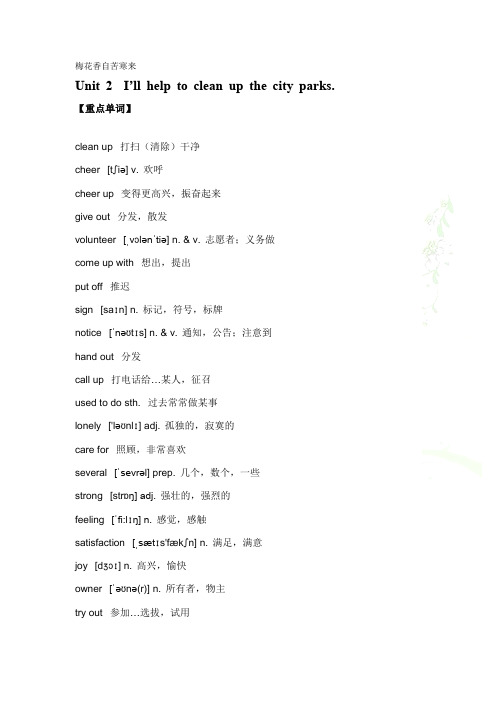
梅花香自苦寒来Unit 2 I’ll help to clean up the city parks.【重点单词】clean up 打扫(清除)干净cheer [tʃiə] v. 欢呼cheer up 变得更高兴,振奋起来give out 分发,散发volunteer [ˌvɔlənˈtiə] n. & v. 志愿者;义务做come up with 想出,提出put off 推迟sign [saɪn] n. 标记,符号,标牌notice [ˈnəʊtɪs] n. & v. 通知,公告;注意到hand out 分发call up 打电话给…某人,征召used to do sth. 过去常常做某事lonely ['ləʊnlɪ] adj. 孤独的,寂寞的care for 照顾,非常喜欢several [ˈsevrəl] prep. 几个,数个,一些strong [strɒŋ] adj. 强壮的,强烈的feeling [ˈfi:lɪŋ] n. 感觉,感触satisfaction [ˌsætɪs'fækʃn] n. 满足,满意joy [dʒɔɪ] n. 高兴,愉快owner [ˈəʊnə(r)] n. 所有者,物主try out 参加…选拔,试用journey ['dʒɜ:nɪ] n. (尤指长途)旅行,行程raise [reɪz] v. 抬起,举起,筹集,征集alone [əˈləun] adv. 独自地,孤独地repair [riˈpɛə] v. 修理,修补fix [fiks] v. 修理,安装fix up 修理,修补give away 赠送,捐赠take after (外貌或行为)像broken ['brəʊkən] adj. 破损的,残缺的wheel [wi:l] n. & v. 轮子,车轮;旋转letter [ˈletə] n. 信件,字母Miss [mɪs] n. 小姐set up 建立,设立disabled [disˈeibəld] adj. 有残疾的,丧失能力的make a difference 影响,有作用blind [blaɪnd] adj. 盲的,盲目的,失明的deaf [def] adj. 聋的imagine [ɪˈmædʒɪn] v. 想象,设想difficulty ['dɪfɪkəltɪ] n. 困难open [ˈəʊpən] v. 打开door [dɔ:] n. 门carry ['kærɪ] v. 携带,搬运train [treɪn] v. 训练,培养training [ˈtreɪnɪŋ] n. 训练,培训excited [ɪkˈsaɪtɪd] adj. 激动的,兴奋的kindness [ˈkaɪndnəs] n. 仁慈,善良,亲切,善意clever [ˈklevə] adj. 聪明的,机灵的understand [ˌʌndəˈstænd] v. 懂,理解change [tʃeɪndʒ] n. & v. 改变interest ['ɪntrəst] n. & v. 感兴趣;兴趣sir [sɜ:(r)] n. 先生madam ['mædəm] n. 夫人,女士【重点短语】1.Clean-Up Day 清洁日2. an old people’s home 养老院3. help out with sth. 帮助解决困难4. used to 过去常常......5. care for 关心;照顾6. the look of joy 快乐的表情7. at the age of 在......岁时8.clean up 打扫(或清除)干净9. cheer up (使)变得更高兴;振奋10. give out 分发;散发11. come up with 想出;提出12. make a plan 制订计划13. make some notices 做些公告牌14. try out 试用;试行15. work for 为…工作;为…. 效力16. put up 建造;举起;张贴17. hand out 分发;散发;发给18. call up 打电话;召集19. put off 推迟;延迟20. for example 比如;例如21. raise money 筹钱;募捐22. take after 与......相像;像23. give away 赠送;捐赠24. fix up 修理;修补;解决25. be similar to 与……相似26. set up 建立;设立27. disabled people 残疾人28. make a difference 影响;有作用29. be able to 能够30. after-school reading program 课外阅读项目【重点句型】1. The boy could give out food at the food bank. 这个男孩可以在食品救济站分发食物。
新人教版八年级英语下册复习短语笔记资料Unit 2 I’ll help to clean up the city parks

Unit 2 I’ll help to clean up the city parks.Section A1.help (to) do sth. / help with sth.帮助做某事;有助于做某事help sb. (to) do sth. /help sb. with sth.帮助某人做某事help oneself to...随便吃点......help sb. out帮助某人摆脱困境/解决难题can’t help doing sth.忍不住做某事2. clean up打扫干净;清除干净clean out清除;把......打扫干净Clean-up Day 清洁日3. cheer up (使)变得更高兴;振奋起来4. give out / hand out 分发;发放give out food at the food bank在食物救济站分发食物give away捐赠;分配;赠送give up (doing sth.)放弃(做某事)give in屈服;让步5. volunteer in an after-school study program 在课外学习班做义工/当志愿者volunteer to do sth.自愿做某事volunteer one’s time to do sth.自愿花时间做某事6. tell sb. about sth.告诉某人有关某事tell sb. sth. = tell sth. to sb.告诉某人某事tell sb. to do sth.告诉某人去做某事tell sb. not to do sth.告诉某人不要去做某事tell... from...辨别......和......;把......和......区分开来tell a story 讲故事tell a lie 撒谎tell a joke讲笑话tell the truth 讲真话7. come up with = think up 提出;想出come up to…朝......走过来come true实现;成为现实8. put off (doing sth.)推迟(做某事);延期(做某事)put up张贴;举起;挂起;搭建put...to use...把......投入使用9. make some notices做一些注意事项notice board布告栏;布告板notice sb. do sth.注意某人做了某事notice sb. doing sth. 注意到某人正在做某事10. write down 写下;记下write sb. a letter = write a letter to sb.给某人写信write back to sb.给某人写回信11. call up sb. = ring up sb. = telephone sb. = phone sb. = give sb. a call=make a phone call to sb.打电话给某人call at sp. = visit sp.拜访某地call on sb. = visit sb.拜访某人call on sb. to do sth.号召某人去做某事12. make some plans to do sth.制订计划去做某事plan to do sth. = plan on doing sth.计划去做某事13. in an old people’s home 在一家敬老院in a children’ s home 在儿重之家at an animal hospital 在一家动物医院14. used to do sth.过去常常做某事use up用光;用完;耗尽come into use开始使用make good use of好好使用;利用15. care for爱护;照顾;照料;喜欢care about关心;在意take care小心;注意take care of = look after 照顾;照看16. one day (过去或将来)某一天;有一天some day = someday(将来)总有一天;将来某一天17. at the age of 在......岁时for ages很长的时间;很久;好久18. decide to do sth. = decide on doing sth. make a decision to do sth.决定做某事19. try out试验;尝试try on试芽(衣服、鞋);试戴(帽子)try doing sth.尝试做某事try to do sth.设法做某事;努力做某事try one’s best to do sth.尽某人最大努力去做某事20. in one’s eyes在某人看来;在某人眼里21. go on a…journey去一个......的旅程22. be busy with sth.忙于某事be busy (in) doing sth.忙于做某事23. at least至少;最少at most至多;最多24. be worried about =worry about 担心;着急25. in one’s free / spare time在某人的业余/空闲时间at the same time 同时at this time = at the moment = now 此刻at that time = then 那时26. for example = for instance 例如such as...比如说......27. raise money for homeless people为无家可归的人募集资金28. stop doing sth.停止做某事stop to do sth.停下来去做另外一件件事stop sb. (from) doing sth.= keep / prevent sb. from doing sth.阻止某人做某事can’ t stop doing sth.不能停止做某事come to a stop停止;终止at the bus stop在公共汽车站Section B29. take after(在外貌、性格等方面)与(父母等)相像30. fixup修理;整理;安装fix up a time for a meeting确定一个开会的时间fix up a time to meet安排一个时间见面31. be similar to...与......相似be the same as...与......一样32. send sb. sth. = send sth. to sb.把某物送给某人send sb. to do sth.派某人做某事send away开除;解雇send up发射;使上升33. setup建起;设立;建立;开办set off出发;动身;激起;引起set out出发;动身;着手34. make a difference有差别;有影响;有作用make a big difference to... 对......有很大影响35. a specially trained dog一只经过特殊训练的狗train sb. to do sth.训练某人做某事36. be excited about...对某事感到兴奋;因为某事而激动be excited at...对某事感到兴奋37. be able to do sth. / can (could) do sth.能够/有能力做某事be unable to do sth. / can’t (couldn’t) do sth. 不能够做某事38. bring sb. / sth. home把某人/某物带回家bring sb. / sth. to sb. / sp.带某人/某物到某人那里/某处bring sb. sth. = bring sth. to sb.给某人带来某物bring out = get out = take out 拿出39. change one’s life 改变生活change one’s mind 改变主意change... into... = turn...into... 把......变成...... change... for...将......换成......have no change with sb.身上没带零钱pay in small change 以零钱付款40. disabled people 残疾人41. be strong in擅长;在......方面不错42. be free to do sth.随意做某事;任意做某事;有空做某事be free = have time 有空;有时间get sth. for free免费获得某物free tickets for the film 免费电影票free sb.使某人自由;解放某人43. ask for索要;请求得到put up signs asking for old bikes张贴寻求旧自行车的广告ask sb. for sth.向某人要某物ask sb. for help = turn to sb. for help向某人请求帮助ask sb. to do sth.要求某人去做某事ask sb. not to do sth.要求某人不去做某事ask sb. about sth.向某人询问某事44. set up a call-in center for parents开通家长热线45. work out算出;制订出;解决;产生结果;成功work out fine效果好;很有效work hard努力工作work hard at...努力学习……;在……方面努力work on继续工作;从事......工作。
英语教案人教版新目标八年级英语下册 Unit 2 I'll help to clean up...

Unit 2 I'll help to clean up the city parksLevel: 8th gradeObjectives:By the end of this unit, students will be able to:Understand and use vocabulary related to environmental issues.Discuss the importance of protecting the environment and taking action to address environmental problems.Write persuasive essays advocating for environmental protection.Materials:Textbook: “New Target 8 English”from People's Education PressWhiteboard and markersHandouts with environmental vocabularyVideo or images related to environmental problems and solutionsWriting prompts for persuasive essaysProcedure:Introduction: Begin the lesson by asking students about their thoughts on the environment and how they think they can protect it. Write some of their responses on the board.Vocabulary: Introduce vocabulary related to environmental issues, using flashcards and pictures to help students understand and remember the words. Examples of vocabulary to cover include "pollution," "recycling," "conservation," "global warming," "deforestation," "fossil fuels," "sustainability," "clean energy," "plastic waste," and "carbon footprint."Listening:Play a video or show images related to environmental problems and solutions, and have students listen and watch to identify the issues and proposed solutions. Ask comprehension questions to ensure they understand what they saw.Speaking:Divide students into pairs and have them discuss the importance of protecting the environment and what they can do to address environmental problems. Encourage them to share their opinions and ideas for taking action.Reading: Distribute handouts with environmental vocabulary and have students read and define the words. Ask comprehension questions to ensure they understand what they read.Writing:Provide students with writing prompts for persuasive essays advocating for environmental protection, such as "Why is it important to protect the environment?" or "What can we do to address environmental problems?" Encourage them to use proper grammar and sentence structures.Review:Review the vocabulary and concepts covered in the lesson, and ask students to share what they have learned. Play a game or do a fun activity to reinforce the material.Extension: Assign students to conduct research on a specific environmental issue, such as plastic waste or air pollution, and present their findings to the class. Encourage them to propose solutions and ways to take action to address the issue.Assessment:Assess student understanding of the material by observing their participation in class discussions and activities, listening to their speaking and reading, and reading their written essays. Offer feedback and corrections as needed, and provide additional practice if necessary.。
(人教版)八年级下册英语教案:Unit 2 I’ll help to c

八年级英语下册(Go for it !)Unit 2 I’ll help to clean up the city park.(No.6---10)Period 4Step 1 Warming up and revision1. Daily greeting.2. 复习动词不定式的用法,并完成相关任务。
3. Check the homework. Let some Ss report “Who’s the … in class?”Step 2 Warming up1. T: Show some pictures of disabled people and their lives, for example,a blind man, some deaf girls. Tell Ss their life may be very difficult. They sometimes need our help.2. Talk about the dog-helper. What can it do?e.g. A dog-helper can lead a blind man to many places. It can get the things a man wanted.Step 3 Presentation1. Present the new words on the big screen and learn the new words together.1) repair v. 修理;修补 2) fix v. 安装;使固定3) give away 赠送;捐赠 4) wheel n. 车轮;轮子2. Ss read and try to remember the new words.3. Work on1aand match the sentences with the similar meaning.4. Check the answers with the Ss.Step 4 WritingWork on 1b1. Ask one student read the phrases and the nouns. Tell Ss to match the phrasal verbs with the nouns. Then make sentences with the phrases.1. I’ve run out of it.2. I take after my mother.3. I fixed it up.4. I gave it away.a. I repaired it.b. I don’t have any more of it.c. I am similar to her.d. I didn’t keep it.2. Let some Ss come to the blackboard and write down their sentences.Then check together.3. Check their desk mates’ sentences.e.g. 1. I gave away my bike to a children’s home.2. I took after my father.3. I gave away my old clothes to the poor kid.4. I ran out of my money last weekend.5. I fix my bike and give it away.Step 5 ListeningWork on1c:1. Tell Ss to look at the pictures in1c. Tell them the boy in the pictures is Jimmy. He’s a good boy. He likes to help others. What is he doing now? Listen to the tapes and number the pictures.2. Play the recording for the Ss. Ss just listen for the first time. Play the recording again and number the pictures.3. Check the answers:Work on 1d1. Let Ss read the sentences in 1d first. Tell Ss to listen again and judge the sentences True or False.1. Jimmy fixes up broken bicycle parts, like wheels.2. Jimmy sells bikes.3. Jimmy takes after his mother.4. Jimmy has run out of money.2. Play the recording again for the Ss to listen and judge.3. Ss listen to the recording carefully and try to judge.3. Check the answers with the class.Step 6 Role-play1. Work in pairs. Role-play a conversation between Jimmy and the reporter. Use the information in1cand 1d.2. Let two students make a model for the Ss.3. Ss practice their conversations4. Teacher can walk around the classroom, and give some help to the Ss.Step 7 ReadingFastReading1. T: Now let’s work on 2b. First, let’s read the questions and make sure we know the meanings of all the questions. Then read the passagequickly and find the answers to the questions.1) What kind of letter is it?2) Who wrote the letter to Miss Li? Why?2. Ss read the letter quickly and try to find the answers to the two questions.3. Check the answers with the class.CarefulReading1. T: Now let’s read these sentences about the letter. Read the passage again. Judge if the sentences are True or False. Please underline under the main sentences.1) The writer can’t use her arms or legs well.2) Lucky was brought to the writer by her friend.3) They have been trained at “Animal helpers” for seven months.4) A dog-helper is for those who are disabled.5) Lucky can understand different orders.2. Ss read the letter again and judge the sentences.3. Check the answers with the class.Language points1. T: Now let’s language pints about the letter.1) I’m sure you know that this group was set up to help disabled people like me.set up 建起;设立e.g. Let’s set up our tent by the river.我们在河边搭建帐篷吧。
